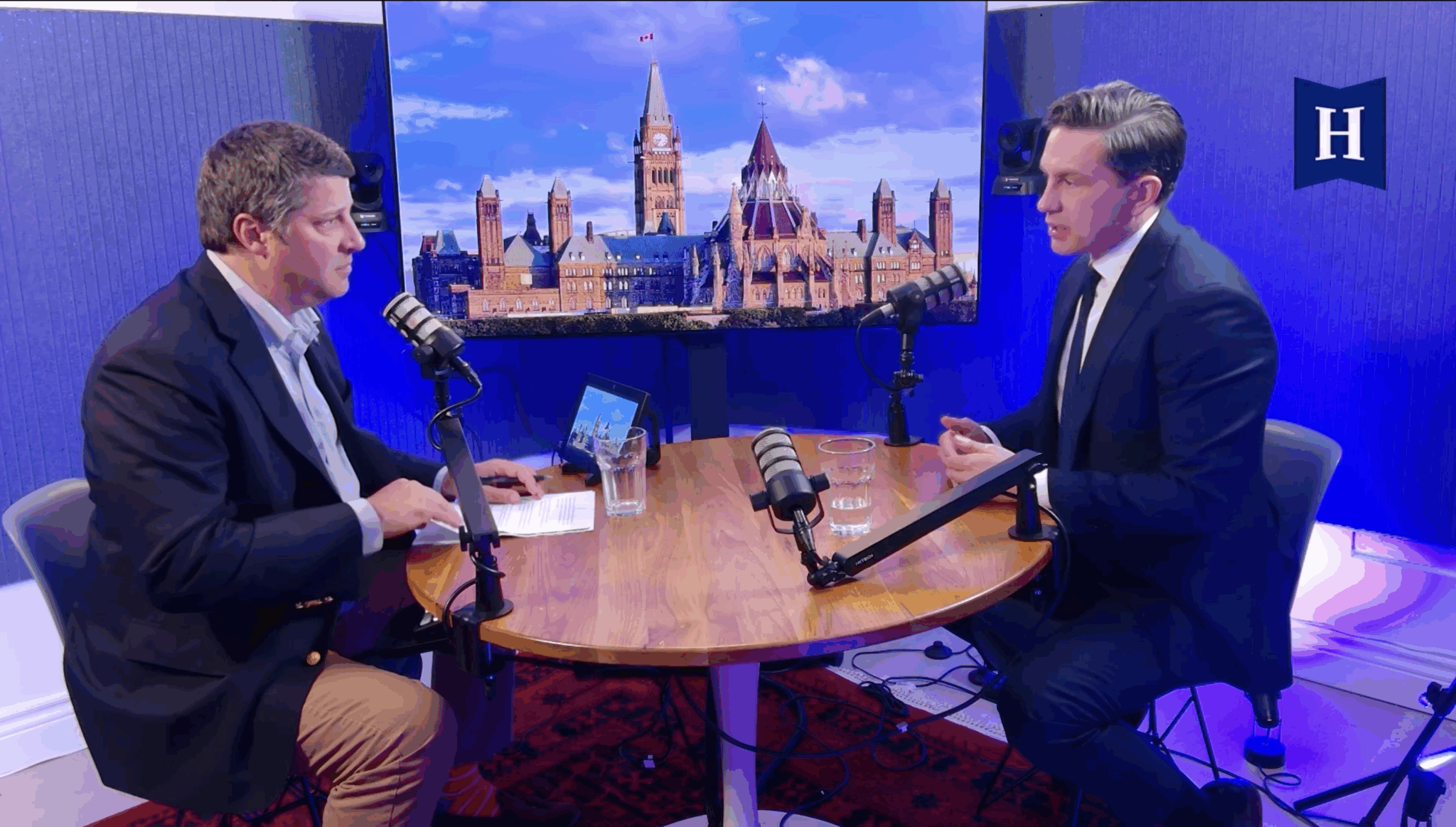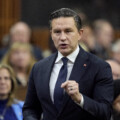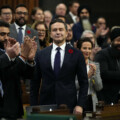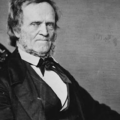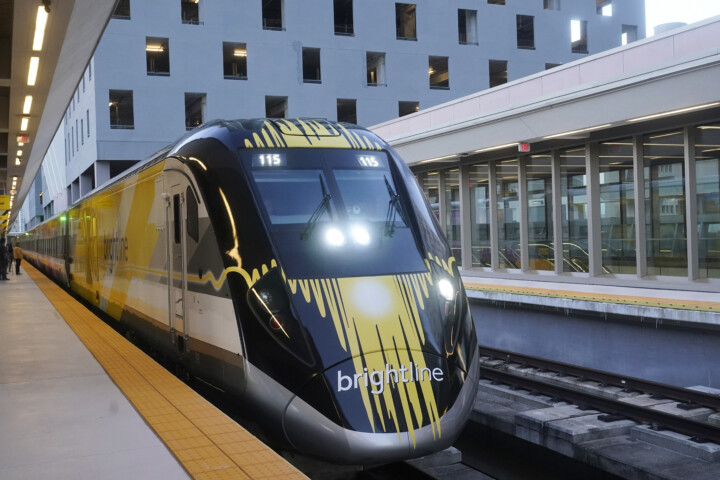This week, Conservative Party leader Pierre Poilievre sat down with The Hub’s editor-at-large Sean Speer for an exclusive post-election interview.
The two discussed why the Conservatives lost to Mark Carney’s Liberal Party, the emergence of a new Conservative voter coalition, and what it will take to convert electoral momentum into victory in the next election. He also shared his thoughts on Donald Trump, the future of media subsidies, and recounted what he learned about Canadians during his coast-to-coast campaign.
The Hub has compiled a list of Poilievre’s best quotes from the interview.
1. The Conservatives have to build on the voter coalition built in the 2025 election
“If you look at our numbers, they didn’t actually come down that much. We got 41.3 percent, which is the highest we’ve got since 1988. So what happened was that everything else consolidated around the Liberals and on one basic issue. We made great gains, a couple million more votes, two and a half million, to be precise, and about 25 more seats. It wasn’t enough to overcome that consolidation.
“Now we have to build on the coalition that we’ve established… How do we crystallize that? How do we keep these people inspired? How do we actually deliver for them the best we can in opposition, and then add the two or three percentage points more of people who didn’t come out for us this time, so that we can get over the top next time?”
2. Trade unions to play an important role in the Conservative Party
“What we’ve seen with trade unions themselves is that they are increasingly very entrepreneurial. They’re a lot more entrepreneurial than some large corporations. They go and train these young people. If you train a young person at a trade union and you don’t actually get them a job, then you don’t collect dues…
…If you sit down with them and ask, ‘What are your priorities?’ It’s not ’Let’s go attend an anti-Israel protest or some other crazy, radical cause.’ It’s, ‘Yes, let’s get that pipeline approved. Let’s speed up home building permits. Let’s get taxes down on diesel fuel. Let’s protect the rights of their members. Let’s protect the right to own firearms for hunting and sport shooting.’ Their basic agenda is the same as what we believe.
I think trade unions are going to play a very important role in the future of the Conservative Party. I was meeting with some of them today, and I want them to come out to our convention and make sure to put their stamp on our policy agenda.”
3. On Carney borrowing his policies
“Well, we will, in the words of Lincoln, stand with a man when he stands right and stand against him when he stands wrong. That’s the approach we have to take [as an opposition to the Carney government]…
[Prime Minister Carney] has made a lot of promises and pronouncements, and he doesn’t have clear plans to actually implement any of it. So I think that the opposition we will end up presenting is on the failure to deliver on all of the promises that he’s made. He’s going to have a hell of a time bringing his party along for that journey, if he really plans to go on that journey, and I think that, as time goes on, we’ll see that a lot of it was more rhetoric than reality…
I don’t think we have to get carried away with the idea that Carney is going to take all of our ideas. He has tried to plagiarize the words, because we won the debate. We won the debate on the carbon tax, on inflation, on natural resources, on housing, and now everyone has to at least pretend they agree with us, because the population does.”
4. Canada must cap population growth
“We definitely have to cap population growth. I say population growth because in the immigration–emigration formula, there are two parts to it. There’s the number of people coming in and the number going out.
Natural population growth in Canada is basically zero, in fact, it was negative last quarter. When I say population growth, I’m really talking about immigration minus emigration. We have a lot of people who are supposed to be leaving in the next year or so. They are international students and temporary foreign workers on temporary visas that are going to run out. So we’re going to need more people to leave than to come for the next several years, and that means having negative population growth in that time period.”
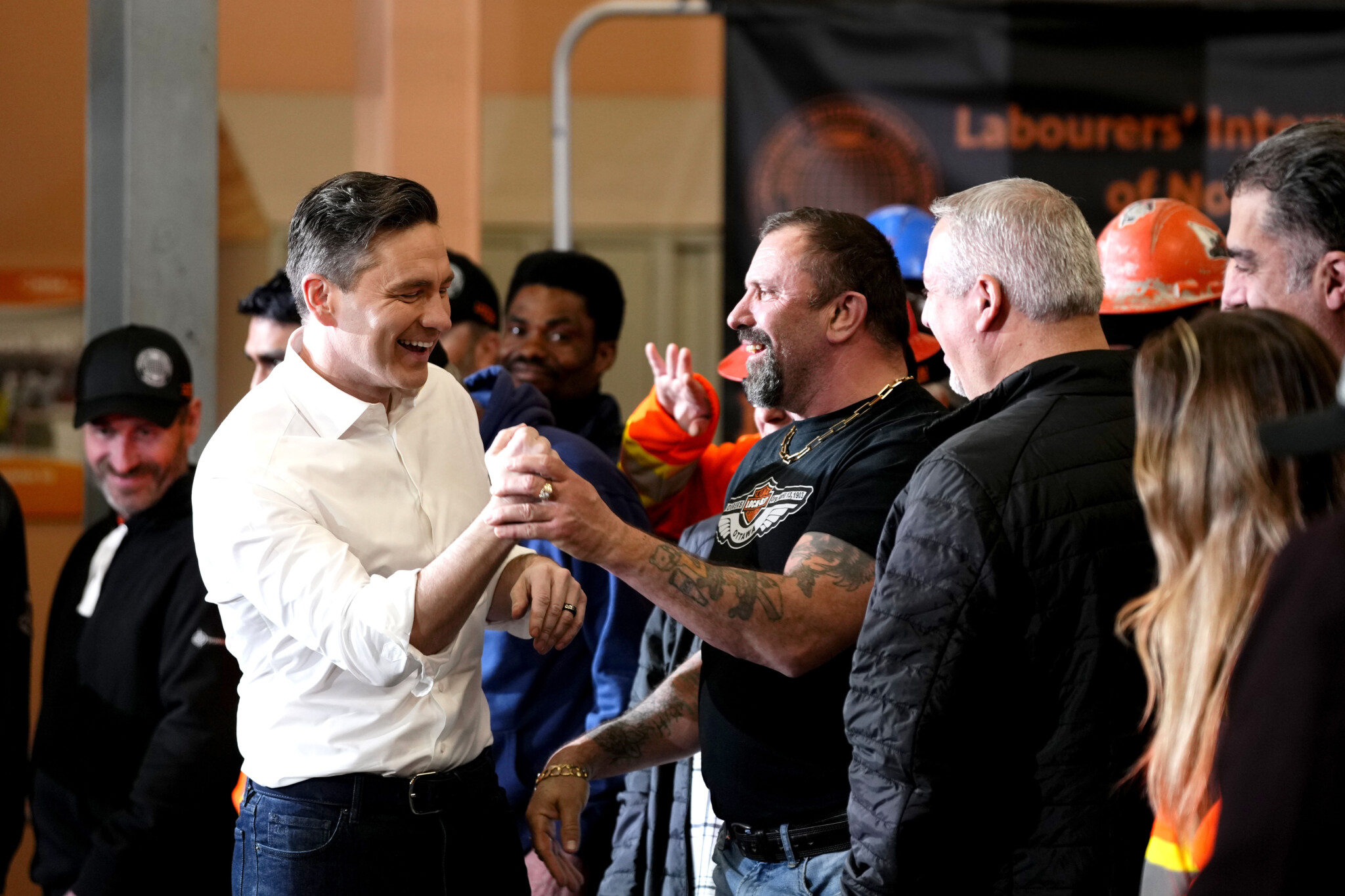
Conservative Leader Pierre Poilievre jokes with a union member as he heads to the lectern to speak at a pre-election event, at LiUNA! Local 527’s training centre in Ottawa, on Friday, March 21, 2025. Justin Tang/The Canadian Press.
5. The government should do the right thing and stand with Israel
“[The Liberals] became an anti-Israel party under Justin Trudeau, and Mark Carney has continued in that vein. They’ve singled out Israel for unfair and unbalanced, disproportionate, and, I think, really disgusting treatment.
The Israelis had a choice: you let the Iranians nuclearize, and then it’s too late. Because once they’ve got nukes, what can you do? You can’t stop them, because then they’ve got their finger on the button, and anything you do becomes an existential outcome. So I predicted a long time ago that Israel would do this, because they had to. And I think the world has to say, ‘Look, if we were in the same situation, if we had a regime that was the exact distance between the two countries… and they had a stated intention to annihilate Canada, to wipe it off the map, and they were known to be working on a nuclear program, would you not expect that your government would want to disable that program?’
And of course, the answer is yes, we would. We’d want to protect our country the way the Israelis are protecting theirs. The government should do the right thing and stand with Israel against this theocratic nuclear ambition that is a threat to the Jewish people.”
6. Carney is pursuing Trudeau’s housing policies “on steroids”
“Carney is pursuing the same policies, but on steroids, as Justin Trudeau.
Trudeau’s approach was to fatten up local bureaucracies with lots of federal transfers, and then they would block building with high taxes and very slow permits. After that, they would create more government programs in Ottawa to subsidize builders to get over the wall that the local governments had created.
So it’s a classic case of a government creating a problem and then saying, ‘Well, the solution is for there to be even more government to overcome that problem…’
We need a policy at the federal level that incentivizes municipalities to get out of the way, speed up permits, free up land, cut development charges, and we need to remove the GST from all home purchases, not just for first-time buyers, who are a very small percentage of buyers in the first place, particularly of new homes.”
7. Carney believes in “state-driven crony capitalism”
“Carney’s ideology is that the state should direct the economy. It’s a central planning model that has failed every time it’s been tried anywhere in the world. It makes a very small group of well-connected insiders vastly richer. He believes in state-driven crony capitalism rather than free enterprise, entrepreneurial capitalism. And it’ll mean big boondoggles. They’ll be making big loan guarantees, grants, and corporate subsidies to favoured insiders. Then, of course, many of those projects will go bad, and the taxpayer will be stuck paying for them. The reality is, there’s no market discipline. When the government is paying the bill, the government takes all the risk, and the private sector gets all the profit. Well, you can figure out very quickly who’s going to win and who’s going to lose.
I believe in the free enterprise system. We should make this the best place for private sector investment, the best place in the world.”
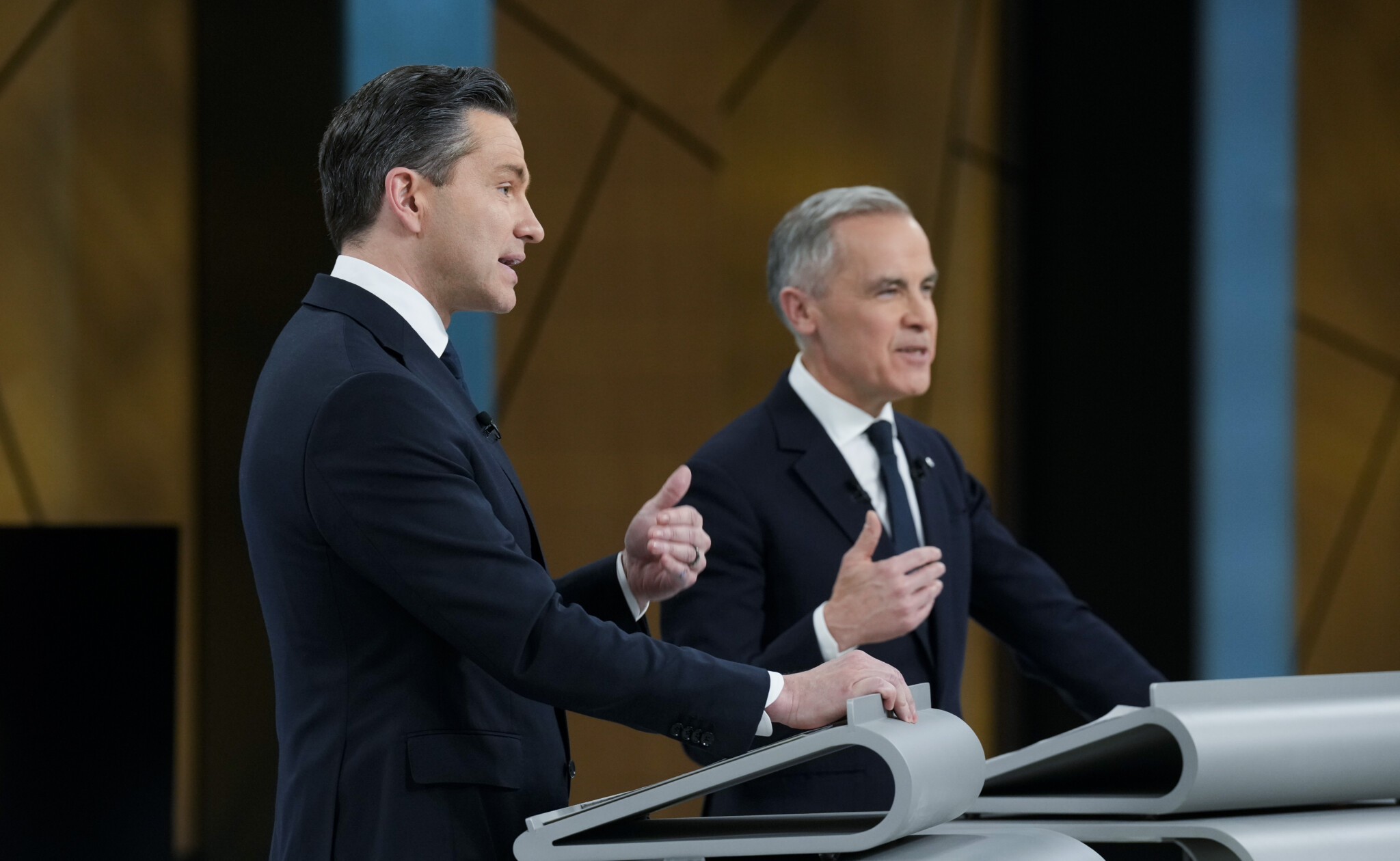
Conservative Leader Pierre Poilievre, left, and Liberal Leader Mark Carney participate in the English-language federal leaders’ debate in Montreal, Thursday, April 17, 2025. Adrian Wyld/The Canadian Press.
8. Centrally planned economies have gotten poorer and poorer
“Look at the Irish. My grandfather came over half a century ago from Ireland to this country, the way many Irish did. Why? Because Ireland was poor. Now, Ireland’s per capita GDP is twice Canada’s. And how did they do that? Well, massive tax relief, an open, free enterprise economy that allows investors to build stuff quickly, start new enterprises, and rewards young people who work hard, get an engineering degree, or start a business. It has become one of the greatest economies in the world, even though the stereotype of us Irish was that we were poor. Now it’s a very rich place.
Look at Switzerland, parts of the U.S., Singapore, and Israel–all places that have taken this approach. They have overperformed. Those that have had big, heavy, centrally planned economies, like the one Carney favours, have gotten poorer and poorer, and inequality has gotten worse and worse.”
9. “Left-Right” labels don’t describe very much
“People who voted for us, a lot of them wouldn’t even consider themselves to be on the Right. The guys I met in union halls across the country, 10 years ago, someone might have said that they were on the political Left. I think what we brought together was a coalition of people who were desperately working to make their lives better for themselves and their families, but were held back mostly by government policies. And they were inspired by the agenda I had to give them back control of their lives.
I don’t really think the whole Left-Right thing describes very much in the real world. I think the nature of our coalition is one of folks who work extremely hard, disproportionately now they are people who make stuff, move stuff, fix stuff, and build stuff, and they really want to earn a good life for themselves. They’re not asking for any kind of favour, they’re just asking for a chance. And I think we’re really becoming the party of opportunity.”
10. Funding for the media should come from subscriptions, advertising, sponsorships…not subsidies
“We said we would keep the Local Journalism Fund. That is a small fund that goes to the independent locals. We thought that was a reasonable thing. But we ran on defunding the CBC, and we think that funding for the media should come from subscriptions, advertising, sponsorships, and other own-source revenue. That’s the future.”
Quotes have been revised and edited for length and clarity.
